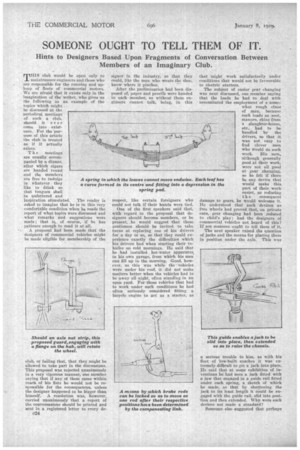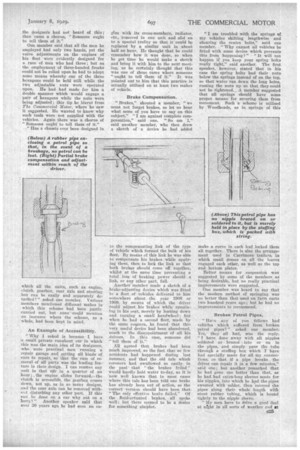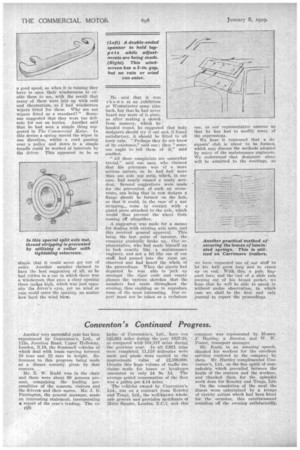SOMEONE OUGHT TO TELL THEM OF IT.
Page 10

Page 11

Page 12

If you've noticed an error in this article please click here to report it so we can fix it.
Hints to Designers Based Upon Fragments of Conversation Between Members of an Imaginary Club.
MHIS club would be open only to maintenance .engineers and those who are responsible for the running and upkeep of fleets of commercial motors. We are afraid that it exists only in the imagination of the writer, who gives us the following as an example of the topics which might.
be discussed at the
periodical meetings of such a club, should it ever come into existence. For the 'purpose of this article the club is treated as if it actually exists.
T ii e meetings are usually accompanied by a dinner, after which cigars are handed round and the members are free to indulge in whatever they like to drink so that tongues shall be unfettered and inspiration stimulated. The reader is asked to imagine that he is in this very comfortable condition when he reads the report of what topics were discussed and what remarks and suggestions were made; that is, of course, if he has patience enough to read it at all.
A proposal had been made that the designers of commercial vehicles might be made eligible for membership of the
club, or failing that, that they might be allowed to take part in the discussions. This proposal was rejected unanimously in a very vigorous manner, one member saying that if any of them came within reach of his fists he would not be responsible for the consequences, unless the designer happened to he bigger than himself. A resolution was, however, carried unanimously that a report of th eonversazione should he printed and sent in a registered letter to every de
c24 signer in the industry, so that they could, like the man who wears the shoe, know where it pinches.
After the preliminaries had been disposed of, paper and pencils were handed to each member, as without these engineers cannot talk, being, in this
respect, like certain foreigners who could not talk if their hands were tied.
One of the first speakers said that, with regard to the proposal that designers should become members, or be present, .he would suggest that these gentlemen should be invited to take turns at replacing one of his drivers for a day or so, so that they could experience exactly the difficulties which his drivers had when starting their vehicles on cold mornings. He said that he had installed hot-water apparatus. in his Own garage, from which his men can fill up in the morning. food, however, as this was while the vehicles were under his roof, it did not make matters better when the vehicles had to be away all night, often standing in an open yard. For those vehicles that had to work under such conditions he had often seriously considered fitting a bicycle engine to act as a starter, as that might work satisfactorily under conditions that would not be favourable. to electric starters.
The subject of easier gear changing was next discussed, one member saying that the loads he had to deal with necessitated the employment of a somewhat rough class of man, because such. loads as soot, manure, skins from a slaughter-house, etc., had to be handled by the drivers, so that it was not easy to find clever men who would do such work. His men, although generally good at their work, were not all good at gear changing, so he felt if there be any device that would make this part of their work easier, so reducing t h e consequent damage to gears, he would welcome it. He understood that such devices as free wheels had proved that, on private cars, gear changing had been reduced to child's play ; had the designers of commercial vehicles not heard of this? If not someone ought to tell them of it.
The next speaker raised the question of jacks and the means for placing them in position under the axle. This was
a serious trouble to him, as with his fleet of low-built coaches it was extremely difficult to get a jack into place. He said that at some exhibition of inNentions he had seen a jack fitted with a jaw that engaged in a guide rail fitted under each spring, a sketch of which he made, so that by shortening the jack to its least length it could be engaged with the guide rail, slid into position and then extended. Why were such devices not made a standard?
Someone else suggested that perhaps
the designers had not heard of this ; then came a chorus, "Someone ought to tell them of it."
One member said that all the men he employed had only two hands, yet the valve adjustments on the engines of his fleet were evidently designed for a race of men who had three ; but as the employment of three-handed freaks could not be relied upon he had to adopt some means whereby one of the three hexagons could be held still while the two adjustable nuts were operated -upon. He had had made for him a double spanner -which would engage a pair of hexagons while the nuts were being adjusted; this tip he lelirnt from The Commercial Motor, where he saw it suggested. He wanted to know why such tools were not supplied with the vehicles. Again there was a chorus of "Someone ought to tell them of it."
"Has a chassis ever been designed in
which all the units, such as engine, clutch, gearbox, rear axle and steeling box can be easily and separately detached?" asked one member. Various members mentioned different makes in which this scheme had been partly carried out, but none -could mention an instance where the scheme, as a whole, had been kept in mind.
An Example of Accessibility.
"Why I asked is because I have 'a small private runabout car in which this was the main idea of its designers, who were practical men running a repair garage and getting all kinds of cars to repair, so that the ease of re= moval of all parts was the leading feature in their design. I can remove any unit in that cdr in a quarter of an hour; , the engine slides forward, the clutch is accessible, the gearbox comes down, not up, as in so many designs, and the rear axle can be removed without disturbing any other part. If this can be done on a car why not on a lorry?" Another speaker said that over 20 years ago he had seen an en g;lne with its cross-members, radiator, etc., removed in one unit and slid on to a special trolley so that it could he replaced by a similar unit in about half an hour. He thought that he could remember how it was done, so when he got time he would make a sketch and bring it with him to the next meeting, as he certainly thought that this was one of those eases where someone "ought to tell them of it." It was Pointed out to him that this practice is actually utilized on at least two makes of vehicle.
Brake Compensation.
"Brakes," shouted a member, "we must not forget brakes, so let us hear what some of you have to say on this subject." "I am against complete compensation," said one. "So am I," said another member, who then drew a sketch of a device he had added to the compensating link of the type of vehicle which formed the bulk of his fleet. By means of this link he was able to compensate his brakes while applying them, then to lock the link so that both brakes should come off together, whilst at the same time preventing a total loss of braking power should a link, or any other part, fail.
Another member made a sketch of a brake-adjusting device which was fitted to a fleet of vehicles delivered to him 'somewhere about the year 1908 or 1909, by means of which the driver could adjust his brakes while remaining in his seat, merely by leaning clown and turning a small handwheel ; but when he had a second fleet, made by the same concern, he found that this very useful device had been abandoned, much to the disappointment of all his drivers. in this case, someone did "tell them of it."
All agreed that brakes had been much improved, as the fact that so few accidents had happened during last summer, and that the old tale which coroners had swallowed so easily in the past' that " the brakes friled " would hardly hold water to-day, as it is now well known that in most cases where this tale has been told one brake has already been out of action, so the correct -version should have been that" The' only effective brake failed." Of the ,fluid-alctuated brakes, all spoke well; but there seemed to be a desire for something simpler. "I am troubled with the springs of my vehicles shifting lengthwise and shearing the centre bolts," said one member. " Why cannot all vehicles be fitted with some device which prevents this from happening?" "It will not happen if you keep your spring bolts really tight," said another. The first speaker, however, stated 'that in his case the spring bolts had their nuts below the springs instead of on the top, so that water ran down the long holes, rusting the nuts up so that they could not be tightened. A member suggested that all springs should have some proper means for securing them from movement. Such a scheme is utilized by Woodheads, as in springs of this
make a curve in each leaf locked them all together. There is also the arrangement used in Carrimore trailers, in which small domes on all the leaves engaged each other, as well as the top and bottom plates.
Better means for suspension was suggested by some of the members as being desirable, but no really practical improvements were suggested.
One member was heard to say that the modern method of springing wag no better than that used on farm carts two hundred years ago; but he had no improvements to recommend.
Broken Petrol Pipes.
"Have any of you fellows had vehicles which suffered from broken petrol pipes?" asked one member. Ye's, they all had, was the reply. "I have done away with all nipples soldered or brazed into or on to the pipes, and simply pass the tube through a stuffing box which T have had specially made for all my connections, so that if a pipe breaks. the driver can repair it in a few minutes," said one; but another remarked that he had gone one better than that, as he had had extra-long sleeves made for his nipples, into which he had the pipes sweated with solder, then 'covered the pipes along their whole length with stout rubber tubing, which is bound tightly to the nipple sleeve. .
"My men have to drive a good deal at nrght in all sorts of Weather and at
_ c2,5
a good speed, so when it is raining they have to open their windscreens to enable them to see, with the result that many of them were laid up with cold and rheumatism, so I had windscreen wipers fitted for them. Why are not wipers fitted as a standard?" Someone suggested that they were too delicate for use on lorries. Another said that he had seen a simple thing sug• gested in The Commercial Motor. In this device a spring moved the wiper in one direction, whilst a cord passing over a pulley and dawn to a simple treadle could he worked at intervals by the driver. This appeared to be so simple that it could never get out of order, Another member claimed to have the best suggestion of all, as he had ridden in a car in which there was a windscreen that gave a clear opening three Mates high, which was just opposite the driver's eyes, yet no wind or rain could enter the opening, no matter how hard the wind blew.
He said that it was how a at an exhibition at Westminster some time back, but that he had never heard any more of it since, so after making a sketch , from memory, which he ; handed round, he suggested that body designers should try it out and, if found satisfactory, it should be fitted to all lorry cabs. "Perhaps they do not know of its existence," said one; then "someone ought to tell them of it," said another.
"All these complaints are somewhat trivial," said one man. who • claimed that his grievance was of a more serious nature, as be had had more than one axle nut strip, while'', in one ease, had nearly caused a nasty accident. Several suggestions were made for the prevention of such an occurrence, one being that in new designs a flange should be formed on the hub, so that it could, in the case of a nut stripping,, come in contact with a guard piece attached to the axle, whichwould thus prevent the wheel from coming off altogether.
A suggestion was made for a means for 'dealing with existing axle nuts, and this received general approval. ' This being the last point of interest, the company gradually broke up. Our representative, who had made himself up to look exactly like a maintenance engineer, and not a bit like one of our staff, had passed into the room tinobserved and had heard the whole of the proceedings. When the guests had departed he was able to pick up amongst the cigar ends and empty glasses the various sketches that the members had made throughout the evening, thus enabling us to reproduce some of the most interesting. Our report must not be taken as a verbatum
one, as our representative assures us that he has had to modify many of the expressions.
We hear it rumoured that a designers' club is about to be formed, which may discuss the. methods adopted by many of the maintenance engineers. We understand that designers alone will be admitted to the meetings, so
we have requested one of our staff to let. his hair grow long and to stand up on end, With this, a pale, haggard face, and the end" of a slide rule Beeping out of his breast pocket, we hope that he will be able to sneak in without undue observation, in which case we shall be the first and only journal to report the proceedings.




































